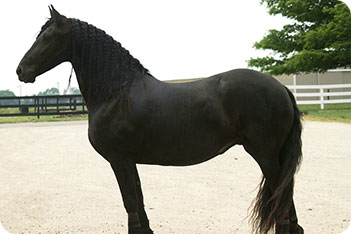
Coughing Disorders
Vet, Horse First Aid
From: Equestrian and Horse | Horse Ailments

Coughing Disorders
- Coughing
- Chronic Obstructive Pulmonary Disease (COPD) or Recurrent Airway Obstruction (RAO).
- Heaves or broken wind
Coughing
A cough is a sudden spasmodic contraction of the thoracic cavity, it can be a one off cough or on a more repetitive basis.
Causes of a cough
- Food ending up in the Trachea instead of the Oesophagus will cause irritation to the Trachea and in response will produce a cough.
- Allergens for example dust and mould spores from bedding or food can irritate the linings of the lungs again inducing a cough reflex.
- Endotoxins such as bacteria can also trigger coughing episodes.
- A build up of phlegm in the Trachea will trigger the cough reflex to help in removing it.
Treatment
Allow the horse a few days to recover and try to remove or reduce the cause of the cough, for example check that you are feeding top quality hay and hard feed and that all the feed bins, utensils and buckets are clean. Soak your horses hay for at least 20 minutes as this will cause the dust and mould spores to swell up so that they cause little irritation or alternatively place your horse onto haylage.
Some cough medicines can prove affective but always consult with your vet first. For a more persistent cough your vet may put your horse onto a bronchodilator help to alleviate the symptoms.
Heaves Or Broken Wind
This is when the horse has to exhale twice which because the abdominal and chest muscles are having to work together to exhale, it causes a heave line to form. These horses will be noticeably distressed and as well as breathing rapidly will show visible difficulty in both breathing in and out. Heaves can occur in chronic cases of COPD and veterinary treatment must be sought.
Chronic Obstructive Pulmonary Disease (COPD)
This is also known as Recurrent Airway Obstruction (RAO) and is a very serious condition that is triggered by dust, mould and pollen spores. It affects the bronchioles and alveolar sacs within the horses lungs. When the dust, mould or pollen spores enter they cause an allergic reaction which causes the horse to produce an increase in the levels of fluid and mucus, this in turn builds up and causes an obstruction of the airways making it much more difficult for the horse to breath. To remove the mucus and fluid build up the horse coughs and depending on the severity of the COPD this can be a mild cough or severe repetitive coughing.
Symptoms
- Coughing during exercise.
- Taking a long time to recover after normal exercise.
- Increased breathing rate when at rest.
- Having difficulty in breathing.
- Coughing up phlegm sometimes with blood in it.
- Heavy noisy breathing.
Treatment
Try to remove as many causes of COPD as possible for example
- Stable on clean dust free bedding such as paper, shavings or if the COPD is bad on rubber matting.
- Ensure that the stable is well ventilated.
- Stable your horse away from other horses who are on straw bedding the dust and mould spores may be causing the allergy.
- Ensure that your horses stable is not near to the muck heap as there will be an increase in mould spores in the area.
- Muck out your horses stable daily and regularly skip out wet patches as the ammonia can irritate the airways.
- Feed top quality haylage or feed soaked hay not dry.
- Turn your horse out as much as possible except when pollen levels are increased then for shorter periods during these times.
- Ensure that all hard feed is wet enough for example add enough water or soaked sugar beet to soften the feed down.
- The feed bins, buckets and utensils must be regularly cleaned to prevent mould and dust spores from building up.
- Try not to over exert a horse prone to COPD as this can only further damage the airways.
- Your vet may prescribe a course of bronchodilators which act to reduce the affects of COPD.
- A steroid injection of cortisone may be given as it helps to lesson the allergic reaction but it can cause an onset of laminitis in horses who are over weight or susceptible.
- Mucolytics are also sometimes given to help disperse large amounts of mucus from the airways.
- Bronchodilators are also sometimes administered usually in the feed or via an inhaler called a spacer.
- A spacer is an inhalation device which goes over the nostril and allows the drugs such as bronchodilators to be breathed directly into the lungs where it can immediately get to work, equine spacers have been used with good results.
- The main cause of the allergic reaction must be found so try to isolate whether it is the hay, bedding, feed, pollen etc. that is causing the COPD so that ongoing management of the condition can occur.